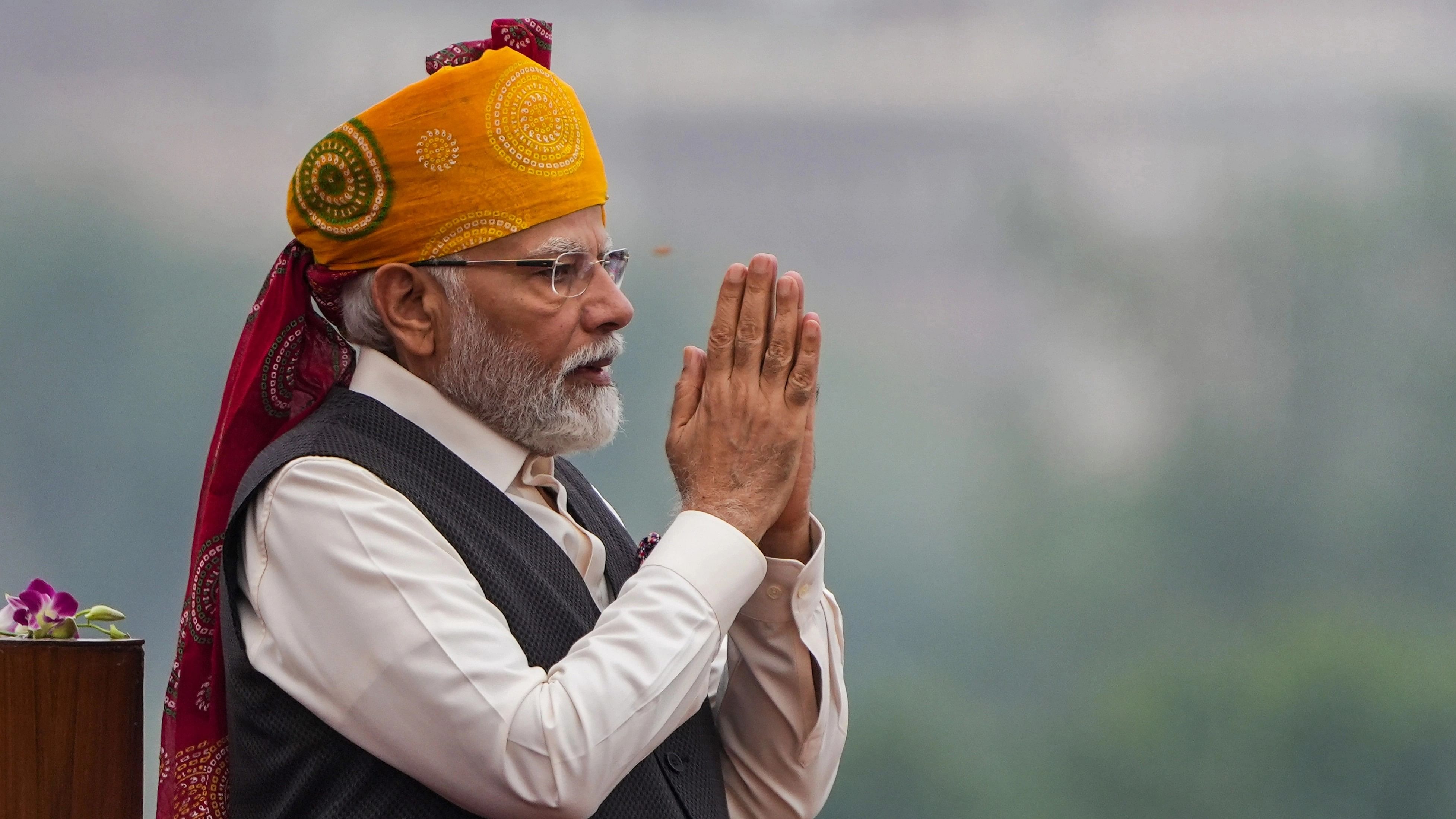
Prime Minister Narendra Modi at the Red Fort for his Independence Day speech.
Credit: PTI Photo
Prime Minister Narendra Modi’s tenth Independence Day speech was a look back at history, it was a report card of his nine years in power, it laid a roadmap for India, and it was heavily political.
Modi’s emphasis on ‘1,000 years of slavery’ was in line with the Right-wing narrative of ‘othering’ the minorities, especially the Muslims, in India. This forced retrospection was aimed at pressing the point that the impact of our actions today should be felt (and guide us) for the next 1,000 years — and that it is important to make the best of the democracy, diversity and demography India enjoys.
Like his previous Independence Day speeches, this one too, at about 90 minutes, was a long speech. The Prime Minister continued his focus on the youth, women, farmers, and the small and medium sector. He stressed on the achievements during his term, and reiterated that India must be a developed nation by 2047, when we celebrate 100 years of Independence.
Significant among the announcements was the Rs 15,000 crore-corpus Vishwakarma Yojana for people in the Other Backward Classes (OBCs), and the plan to train women self-help groups in operating and repairing drones to boost agritech.
A bit bumpy
Despite being a master orator, this Independence Day speech is not his best; there were uncharacteristic pauses throughout the speech, and the switch from ‘Mere pyar deshvasiyo’ (used in his previous Independence Day speeches) to ‘Mere pyare (priya) privar janon’ appeared forced. This switch, however, blended with Modi’s message towards the end of his speech, where he said, ‘I am one among you, live for you, dream for you, work for you…I do it because you are family’. Enough about the semiotics.
I’ll be back
An uber confident Modi said that he would be back at the Red Fort ramparts next year to deliver the Independence Day speech. Given that next year is the general elections, the political import of the statement is clear. A few days back, while replying in Parliament, to the Opposition’s no confidence motion, the Prime Minister made a similar observation. But democracy in India is not a James Cameron film, and Modi is not Arnold Schwarzenegger to say ‘I’ll be back’. There is a big chance that the Bharatiya Janata Party (BJP) might retain power in 2024 — but till then the electorate’s freedom of choice and intelligence must not be taken for granted. Such conclusions undermine the democratic process in the world’s largest democracy.
Focus on economy
This year’s Independence Day speech was also aimed at a global audience. In a year that India holds the G20 presidency, Modi has told the world that India is the voice of the Global South, that India is a safe and secure destination, and that India has earned its spot at the global high table through its efforts during the COVID-19 pandemic.
In his speech, Modi stressed on India’s economy going from the tenth spot globally in 2014 to becoming the fifth now, and would move up in the near future. It is a matter of pride to scale these heights globally, but is this growth with a low per capita income a bit hollow? Former Union Finance Secretary Subhash Chandra Garg succinctly explains this in his Deccan Herald article, where he says, “It is not any special efforts of the Modi-led NDA government, but serendipity, India’s relatively higher, albeit modest, growth, and static economies of Germany and Japan which will make India the third highest economy in 2027-28.”
‘Coalition dharma’
The highlight of the Prime Minister’s speech, which was kept towards the latter half of it, was the three obstacles he identified as detrimental to India becoming a developed nation: corruption, dynastic politics, and appeasement politics. Modi said it was his life goal to fight corruption. The stress was on the individual, and not the party. The attack on dynastic politics was most likely aimed at the political parties in the Opposition.
However, by focusing on these points, was Modi distancing himself from the politics of the BJP? The BJP has joined hands with leaders of regional parties in states (like in Maharashtra) where until recently they were being called out for being corrupt. When it comes to dynastic politics, the BJP is second to none. From Dharmendra Pradhan to Piyush Goyal, and from Anurag Thakur to Pankaj Singh, the list of political dynasts in the BJP is long. Then, of course, the BJP has Jyotiraditya Scindia.
Does corruption and dynastic politics get exonerated when it is done by the BJP? Or is the Prime Minister creating an air gap between him and his party where the political compromises of the BJP should not reflect on Modi’s persona? Is Modi distancing himself from the BJP’s ‘coalition dharma’, especially if the party were to make political compromises in the runup to assembly and Parliament elections?
Running up to an election season, Prime Minister Narendra Modi’s Independence Day speech was more electioneering in nature than his previous speeches from the ramparts of the Red Fort.
(Twitter: @VijuCherian)
Disclaimer: The views expressed above are the author's own. They do not necessarily reflect the views of DH.